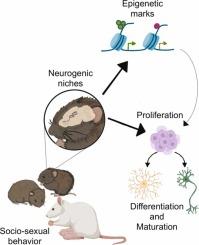Epigenetic changes and neurogenesis associated with socio-sexual behaviors
IF 7.9
1区 医学
Q1 BEHAVIORAL SCIENCES
引用次数: 0
Abstract
Epigenetic mechanisms are essential in neurogenesis during development and adulthood. DNA methylation, histone post-translational modifications, and non-coding RNAs regulate gene expression to maintain the neural stem cell pool and direct the fate of newborn neurons by modulating cell proliferation, migration, differentiation, maturation, and survival. Adult neurogenesis exhibits bidirectional interactions with non-social and socio-sexual factors such as sexual behavior, mate recognition, pair bonding, parental behavior, and offspring recognition. Epigenetic mechanism disruption has been implicated in metabolic diseases, cancer, and neurodegenerative disorders. Nevertheless, the precise role of these mechanisms in adult neurogenesis and their subsequent effects on behavior are not fully understood, particularly in the context of social interactions. This review examines emerging evidence that links epigenetic mechanisms and neurogenesis to the complex interplay between biological processes and socio-sexual behaviors, focusing specifically on socially monogamous prairie voles.

与社会性行为相关的表观遗传变化和神经发生。
表观遗传机制在发育和成年期间的神经发生中是必不可少的。DNA甲基化、组蛋白翻译后修饰和非编码rna通过调节细胞增殖、迁移、分化、成熟和存活来调节基因表达以维持神经干细胞库和指导新生神经元的命运。成人神经发生与非社会和社会性因素(如性行为、配偶识别、配对结合、亲代行为和后代识别)表现出双向的相互作用。表观遗传机制的破坏与代谢性疾病、癌症和神经退行性疾病有关。然而,这些机制在成人神经发生中的确切作用及其对行为的后续影响尚不完全清楚,特别是在社会互动的背景下。本文综述了将表观遗传机制和神经发生与生物过程和社会性行为之间复杂的相互作用联系起来的新证据,特别关注社会一夫一妻制草原田鼠。
本文章由计算机程序翻译,如有差异,请以英文原文为准。
求助全文
约1分钟内获得全文
求助全文
来源期刊
CiteScore
14.20
自引率
3.70%
发文量
466
审稿时长
6 months
期刊介绍:
The official journal of the International Behavioral Neuroscience Society publishes original and significant review articles that explore the intersection between neuroscience and the study of psychological processes and behavior. The journal also welcomes articles that primarily focus on psychological processes and behavior, as long as they have relevance to one or more areas of neuroscience.

 求助内容:
求助内容: 应助结果提醒方式:
应助结果提醒方式:


